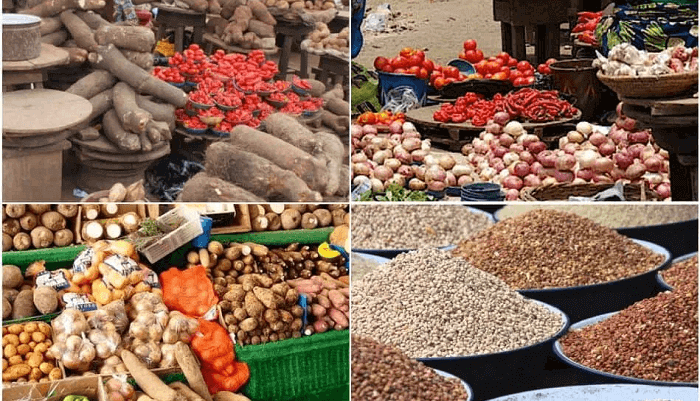There may be no end in sight yet to the on-going rapid rise in the prices of food as the causes of food price rise persist. This reflects the worries of some economists who have shed their thoughts with NATIONAL ECONOMY.
The United Nations estimates 25 million people in Nigeria of the total population are food insecure.
Analysts said insecurity, climate change and inflation are the major triggers of food insecurity in Nigeria. The situation worsened after the government stopped paying subsidies on fuel in May, sharply increasing costs for food, transportation and energy.
Nigeria scrapped fuel subsidies, leading to price hikes in food, transportation and energy costs. Data released for December by the National Bureau of Statistics showed Nigeria’s food inflation hit 33.9 per cent. Analysts said the trend could exacerbate suffering in a country with an estimated 25 million food-insecure people.
Nigeria’s currency devaluation is also impacting commodity prices and contributing to overall inflation.
According to the World in Data analysis, Nigeria is among countries with the highest food expenditure with an estimated 60 per cent of total personal income spent on food.
In the vast tapestry of economic challenges that Nigeria grapples with, the ominous specter of steeply rising food inflation casts a long and foreboding shadow over the nation. A confluence of multifaceted factors converges to propel this unsettling trend, creating a complex narrative that extends beyond mere surface explanations.
Lecturer at Adeleke University, Professor Tayo Bello, harping on the issue, said a primary catalyst for the persistent surge in food inflation is the intricate web of supply chain disruptions. He said Nigeria, a country heavily reliant on agriculture, faces a myriad of challenges in ensuring a smooth flow of goods from farms to markets. He noted that inadequate infrastructure, ranging from dilapidated roads to inefficient storage facilities hamper the seamless transportation of agricultural produce. “This logistical bottleneck not only increases operational costs for farmers but also results in significant post-harvest losses, exacerbating the scarcity of food in the market,” he stated.
But Dr. Sam Inyang, an agronomist, ascribed Nigeria’s rising food insecurity to climate change. According to Inyang, “Climate change emerges as another formidable antagonist in this tale of inflation. Unpredictable weather patterns and extreme climatic events, including droughts and floods, wreak havoc on agricultural productivity. The susceptibility of Nigeria’s agrarian landscape to the capricious whims of nature undermines efforts to achieve food security. As crop yields diminish and cultivation becomes increasingly unpredictable, the scarcity of key staples intensifies, thereby contributing to the upward spiral of food prices.
“Furthermore, the global economic landscape plays a role in the inflationary dance that Nigeria is ensnared in. Fluctuations in international commodity prices, especially for staples like grains and oilseeds, resonate deeply within the Nigerian economy. Depreciation of the national currency, coupled with the volatility of global markets, amplifies the cost of importing essential goods. As a result, the burden is passed onto consumers, further fueling the inflationary flames that engulf the nation,” said Inyang.
On his part, the vice president of an international agriculture company in Nigeria, who pled anonymity, said, “Social and political factors also contribute to the grim prognosis of continued food inflation in Nigeria.”
He stressed that rising insecurity, manifested in the form of conflicts between herders and farmers, and the menace of insurgency, disrupts agricultural activities and displaces rural communities. “This not only diminishes the labour force in the agricultural sector but also instills fear and uncertainty, deterring potential investors. The resultant reduction in production capacity amplifies the scarcity of food, leading to increased prices that disproportionately affect the vulnerable segments of the population,” he noted.
He added that the steep rise in food inflation in Nigeria is a complex saga woven from the threads of supply chain inefficiencies, climate vagaries, global economic dynamics, and socio-political challenges.
“Until concerted efforts are made to address these underlying issues, the ominous trajectory of soaring food prices is likely to persist, casting a long shadow over the nation’s economic landscape and the well-being of its citizens,” said he.
Nigeria’s suspended humanitarian affairs minister, Betta Edu, said authorities are responding to the challenges, in part by declaring a state of emergency on food security.
“We have lots of interventions that we’re putting on the table and the payment of this conditional cash transfer is ongoing. The conditions attached to it are that they invest in their businesses, and ensure that their children go to school. These are all targeted at improving the lives of people and alleviating poverty. The third part is providing fertilisers for poor local farmers to be able to produce food that we’ll buy off from them and sell as food rations.”
But it is obvious that despite these efforts by the government, food insecurity remains a serious challenge for Nigerians.
Experts said the situation will worsen if food inflation continues to rise, and that vulnerable people will be most adversely affected and prosperous future.





